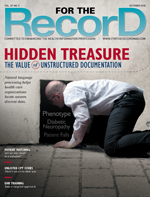October  2018
2018
Editor's Note: Incentivize This
By Lee DeOrio
For The Record
Vol. 30 No. 9 P. 3
"Sit. OK, here's your treat."
"Clean your room and we'll go to the ice cream parlor."
"Construct an EHR that's useful and we'll give you some taxpayer money."
It's easy now to play Monday morning quarterback and decry the federal government's approach to getting physicians and hospitals onboard with EHRs. It's legitimate to wonder where the critics were at the beginning of the effort and accuse them of piling on when it's convenient. Granted, there were a few outspoken health care leaders who questioned the strategy. However, most were annoyed by the requirements, not the overall line of thinking.
In any event, here we are now with meaningful use going incognito as "Promoting Interoperability," which includes a pretty significant overhaul to how providers will be judged. Although the legislation affects only hospitals and outpatient Medicaid providers, Robert Tennant, director of HIT policy for the Medical Group Management Association, declared the revision a "huge win" for providers.
"I don't think the government recognized how difficult it would be to move from stage 1 to stage 2 to stage 3 [meaningful use] requirements and the significant costs involved," Tennant told Modern Healthcare. "We hope that it signals an interest in Congress in having the administration and [Health and Human Services] not make these quality reporting programs so onerous that it results in large swaths of providers not being successful."
Nevertheless, there remain inherent problems in EHR design, which, it is argued, is more focused on billing and meeting federal requirements than promoting practice workflow and improving patient care.
Many physicians view EHR documentation unfavorably, a significant hurdle with effects that extend all along the care continuum. At the recently concluded AHIMA conference in Miami, William E. Haik, MD, CDIP, FACCP, used the trope "garbage in, garbage out" to illustrate the numerous ways in which physicians are impacted by documentation. As you might imagine, it was an extensive and far-ranging list encompassing everything from payment and costs to quality reporting and patient care.
Haik recommended, among other things, that physicians make better use of SOAP notes, placing emphasis on the assessment and plan components. Unfortunately, many physicians contend that, subjective and objective aside, it takes excessive clicking and scrolling in the EHR to find the assessment and plan. Wouldn't you know it?



